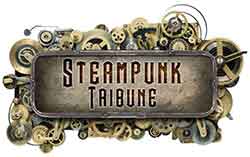Robber Barons gathering for an era photo op…
This particular piece of work caught my attention for a trifecta of reasons. First, it is completely within the Steampunk time range historically, essentially covering the American Steampunk era. Secondly, one of Steampunks archetypes is the devilish robber barron / millionaire who is a nemisis to the small inventor / business man, and the regular “Horatio Alger”-esque attempt to produce an invention / make a scientific discovery / right a social wrong / save the farm, home, or lab, ect As such, this is the RL social background that provided this particular scenario. Finally, a movie that had a limited release, “There will be Blood”, staring Daniel Day Lewis, focuses on a prospector who becomes an oil magnate in turn of the century California. It has received extremely good review, and although doesnt have any major steam or gear work, appears to be representational of the era mindset…
———-
Newspaper cartoon mocking the railroad tycoons
Author Mark Twain (1835-1910) coined the them the Guilded Age to refer to the period of American history between the end of the Civil War (1861 1865) and roughly 1900. The Guilded Age was characterized by massive immigration from abroad, ostentatious displays of wealth, and rising tensions between the rich and the poor. The term was not intended as a compliment: Twain and other social critics used it to suggest that underneath the eras gaudy excesses and superficial prosperity was a country in crisis.
The industrialization of the United States, which had begun before the Civil War, rapid intensified after the conflict. Within a few years, the rates of railroad and factory construction passed their pre-war levels, and the United States surpassed France and Great Britain as the worlds leader in industrial production.
Lavish train car for the extremely wealthy
At the same time, a wave of consolidation merged smaller companies into giant national conglomerates like Standard Oil. Consolidation made industries more efficient and generated enormous wealth for their owners. Corporate executives the eras robber barons like Cornelius Vanderbilt collected paychecks so large they had no president in American history and used them to build lavish mansions in wealth enclaves like Newport, Rhode Island.
Newspaper image of labor unrest
However, during this period, wages for workers stagnated or even declined, and widespread dissatisfaction with the economic system led to calls for reform. The labor movement gained steam during the Guilded Age in response to the low pay and long hours expected of American workers. Beginning in the 1880s, labor unrest spread to many major industries.
New immigrants (and cheap labor going to the US)
The government, still under the sway of the laissez-faire philosophy of staying out of economic affairs in the market place, initially rebuffed calls to interfere with the businesses during the Gilded Age. However, over time, the excesses of the tycoons became too great to ignore. Starting in the 1880s, the government incrementally increased the regulation of major industries and moved to rein in the power of the robber barons.
Additional facts:
1) The phrase Gilded Age was derived from the play King John by William Shakespeare: “To gild refined gold, to paint the lily is wasteful and ridiculous excess.”
2) Twain first used the phrase in The Guilded Age: A Tale of Today (1873), a book he cowrote with Charles Dudley Warner that was one of his few literary collaborations.
3) Industrialists welcomed the roughly ten million immigrants who came to the United States during the last half of the nineteenth century, since the huge supply of labor meant they could keep wages low.
Kidder, D. & Oppenheim N., (2007). The Intellectual Devotional, page 158.
TID Volumes, New York: New York
Cover of Railroad Tycoon III
One last note: My introduction to this particular slice of Steampunk happened years ago, when the legendary Sid Meyer released “Railroad Tycoon” on an unsuspecting public. Between breaks of the addiction known as “Civilization I (and later II)”, I would play this game and be as evil and manipulaitve as possible (being a “Robber Baron” is fun!). Nowadays, it is in its third incarnation, and though I havent played it (on SL, tyvm), I am certain it is quite addictive!



